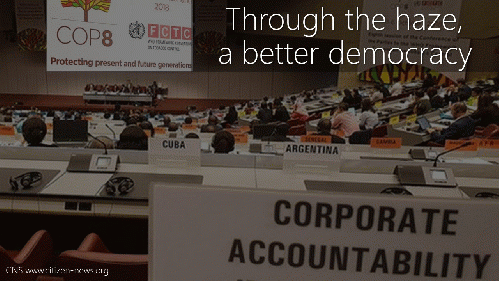Patti Lynn, CNS Columnist

A better world is possible with people taking power back
(Image by CNS (Citizen News Service)) Details DMCA
Although you wouldn't know it from the rhetoric and actions of the Trump Administration, the U.S. is part of the global society. And while most of the U.S. was focused on a Supreme Court nomination that shook our democratic institutions, a watershed moment for democracy quietly took place half a world away. For those in the U.S. seeking evidence that a truer democracy can be realized, recent developments in the advancement of the World Health Organization's (WHO) global tobacco treaty offer much needed hope.
Admittedly, it was hard to see through all the haze created by the industry-sponsored vaping parties documented by the New York Times at the recent global tobacco treaty talks. But even as Big Tobacco attempted to wine and dine its way into better favor with global public health officials, more than 180 countries resolved to keep Big Tobacco away from treaty talks for good.
For 15 years, the tobacco industry has seen the global tobacco treaty as a primary threat to its deadly business. Indeed, the treaty, formally known as the World Health Organization Framework Convention on Tobacco Control (WHO FCTC), is the gold standard when it comes to protecting people from corporations' abuses. Adopted in 2003, the binding treaty has given countries around the world a mandate to implement lifesaving protections, including implementing smoke-free spaces, graphic warning labels, and preventing the industry from targeting young people.
Not surprisingly, the tobacco industry has pulled out all the stops to undermine this treaty, engaging in a range of underhanded and outright illegal activities. In recent years, BBC revealed British American Tobacco's alleged widespread bribery scheme in East Africa. Reuters exposed Philip Morris International's secret operations to block or water down treaty mandates. The Guardian documented the industry's tactic to sue countries implementing stringent public health protections. And that's just for starters.
But the thing is, the global tobacco treaty actually protects policy from these things. As visionary Global South government leaders crafted the treaty--with the support of public health and corporate accountability advocates like my organization (Corporate Accountability, www.corporateaccountability.org) -- they included specific provisions that prevented the industry from influencing and participating in its own regulation.
You can imagine how, given the deep pockets and reach of the industry, it might take time and a tremendous amount of political will to move from words on a page to action. But it happened: on October 6, the majority of the world's governments agreed -- by consensus -- to close a loophole that had allowed Big Tobacco to participate in treaty negotiations as members of "the public." And participants to the treaty meetings will now have to declare any conflicts of interests they have.
This is all the more important because Big Tobacco is on the march to gain access to, and subsequently interfere with, the public health policy in a new way. Tobacco corporations have entered into the electronic cigarette market with a vengeance, investing millions of dollars in these highly addictive products. They are demanding that the public health community consider vaping as harm-reduction, and therefore they should play a role in policymaking--never mind the harmful effects of nicotine and other additives, nor the fact that these products are addicting young people to nicotine at alarming rates.
(Note: You can view every article as one long page if you sign up as an Advocate Member, or higher).





